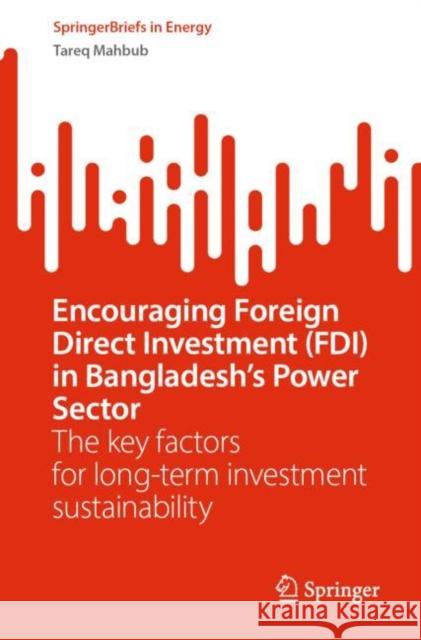Encouraging Foreign Direct Investment (FDI) in Bangladesh’s Power Sector: The key factors for long-term investment sustainability » książka
Encouraging Foreign Direct Investment (FDI) in Bangladesh’s Power Sector: The key factors for long-term investment sustainability
ISBN-13: 9783031279898 / Angielski
Encouraging Foreign Direct Investment (FDI) in Bangladesh’s Power Sector: The key factors for long-term investment sustainability
ISBN-13: 9783031279898 / Angielski
(netto: 192,11 VAT: 5%)
Najniższa cena z 30 dni: 192,74
ok. 16-18 dni roboczych.
Darmowa dostawa!
This book identifies and investigates the determinants that influence investment decision making for conducting foreign direct investment (FDI) in Bangladesh’s power sector. The book is organized around six core themes. These are: the first private power generation policy of 1996 that paved the way for the participation of domestic and foreign IPPs in the power sector and the key incentives provided to attract FDI; an overview of Bangladesh’s power sector including the current developments in the increase of generation capacity that has more than tripled in the last decade, cross-border power trade, the use of coal, liquefied natural gas (LNG), renewable energy and potential nuclear power in the energy mix; identifying the key investment areas that are drawing FDI in the power sector; the key factors that are influencing FDI; potential challenges; and future policy inferences for sustainable FDI in the power sector.The main arguments posited in this book are: institutional factors are the most important in drawing FDI in the power sector; land acquisition is a perineal problem that continues to hamper the development of large-scale power projects; there is a need for a transparent and competitive bidding system to improve transparency and accountability in private power procurement through FDI; and more exploration of onshore and offshore gas fields with the extension of gas transmission networks across the country that secure a regional balance of primary energy supply (gas) for setting up additional gas-based power plants. The primary objective of this book is to identify the key factors that attract FDI from the four broad categories of investment prospects namely, regulatory, economic and financial, political and societal. Therefore, it considers a broader and more holistic view of the roles of various institutions and their causal mechanisms in attracting sustainable FDI in Bangladesh’s power sector.
This book identifies and investigates the determinants that influence investment decision making for conducting foreign direct investment (FDI) in Bangladesh’s power sector. The book is organized around six core themes. These are: the first private power generation policy of 1996 that paved the way for the participation of domestic and foreign IPPs in the power sector and the key incentives provided to attract FDI; an overview of Bangladesh’s power sector including the current developments in the increase of generation capacity that has more than tripled in the last decade, cross-border power trade, the use of coal, liquefied natural gas (LNG), renewable energy and potential nuclear power in the energy mix; identifying the key investment areas that are drawing FDI in the power sector; the key factors that are influencing FDI; potential challenges; and future policy inferences for sustainable FDI in the power sector.











